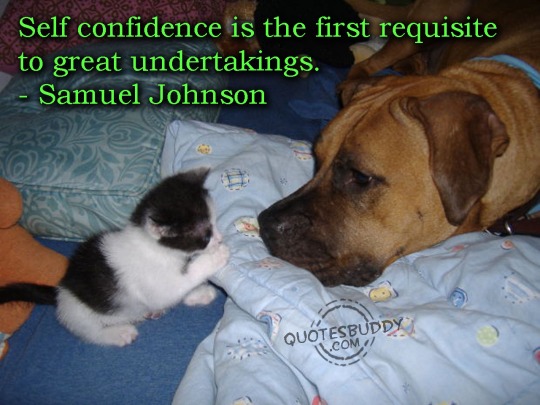
What is self-esteem?
Everyone holds opinions about the type of person that they are. These opinions are at the heart of self-esteem and they affect how you feel about and value yourself. Self-esteem is not static and fixed; your beliefs about yourself can change throughout your life as a result of circumstance and experience.
If you have low self-esteem these beliefs will often be negative. You may focus on what you feel are your weaknesses, and mistakes that you have made.
People think I am confident because I can address a room full of people. The reality is that I spend most of my time thinking that I’m not good enough. If I… give a speech, I spend the next few days thinking about all the mistakes I made.
If you have high self-esteem, you will generally see yourself in a positive light.
You might find that life events such as losing your job, ending a relationship or being bereaved give your confidence a huge knock, but high self-esteem can act as a buffer to absorb these knocks and help you bounce back.
Your beliefs make the difference between high and low self-esteem. It is important to realise that these are only opinions, they are not facts. They can be biased or inaccurate, and there are steps you can take to change them.
How is self-esteem related to mental health?
Low self-esteem alone is not a recognised mental health problem, but if you have low self-esteem it will have an effect on your mental health.
Holding negative beliefs about yourself lowers your resilience and ability to cope with the stresses of life. This can place you at a higher risk of developing mental health problems such as eating disorders, depression or social phobia, which are closely related to your mood and self-belief.
Low self-esteem can be triggered or made worse by existing mental health problems, such as a panic disorder or schizophrenia. You may find that the pressure of other symptoms and the stigma associated with mental health problems impacts on the way you see yourself.
What causes low self-esteem?
It is not possible to point to one cause of low self-esteem for everyone, because each of us follows a different path through life. The formation of your core beliefs about yourself is a complex process.
Your own inborn nature or temperament will play a role, but your experiences and relationships with the people around you also have an important part to play.
Negative experiences in childhood are often particularly damaging to self-esteem. In your early years your personality and sense of self is being formed, and harmful experiences can leave you feeling that you are not valued or important. You have not had a chance to build up any resilience, so this negative view can become the one that you believe about yourself.
Significant negative experiences in adult life can also shake core beliefs and cause them to change. This will normally happen over time and you might not realize at first that your self-esteem is being lowered. Experiences that commonly impact on people’s beliefs include:
- being subject to abuse – sexual, emotional or physical, and the loss of control associated with this
- having your physical and emotional needs neglected in childhood
- failing to meet the expectations of your parents
- feeling like the ‘odd one out’ at school
- coming from a community which often experiences prejudice, such as being an asylum seeker, or being poor but living in a wealthy neighbourhood
- peer pressure to conform to social norms which you don’t agree with
- bullying or excessive pressures at work
- trauma
- physical ill-health – its impact on your quality of life and activities you can do
- bereavement
- facing redundancy or being unemployed
- social isolation and loneliness.
The way you feel about experiences such as these will depend on lots of other factors, but negative core beliefs about your intelligence, appearance and abilities will often be formed:
I think I’m ugly and unattractive. Other people are more intelligent, talented and interesting than me. Most people wouldn’t want to spend any time with me because of these things.
When something happens that reminds you of these significant experiences, you expect the worst and are likely to react badly. Your low expectations are likely to be at the back of your mind all the time.
- You will probably feel anxious and might shake, blush and panic (see Understanding anxiety for more information).
- You may also try to avoid the situation all together, or behave in a way that you think will keep you ‘safe’, e.g. not going to a social event on your own.
This reaction is likely to confirm the negative core beliefs you have about yourself and leave you feeling you have even less chance of coping with a similar situation in the future.
This cycle might seem unbreakable, but it is crucial to remember that these are beliefs, not facts, and they can be changed.
What are the consequences of low self-esteem?
The impact of low self-esteem on your life can be significant, you may find that all areas of your life are affected in some way and confirm your core belief that you are of little value. The section above shows how low self-esteem can interact with mental health problems, exacerbating existing conditions and making you more vulnerable to developing other problems. It can also influence your day-to-day life.
Personal relationships
If you have low self-esteem you might find that you form damaging relationships. You may feel you don’t deserve to be treated with love and respect, and so allow friends or partners to take advantage of you or control you.
Social life
For some people with low self-esteem it can be very difficult to hear criticism and you might find that you are overly-sensitive and upset very easily. You might therefore stay away from activities that can expose you to any type of judgement, leaving you to become isolated and frustrated.
Work
If your low self-esteem comes from a belief that you are not competent or intelligent, you may struggle in the workplace, avoiding tasks that you don’t feel confident about or trying to produce work which is perfect. You might find it difficult to complete applications or go to interviews as you do not believe you are good enough.
Low self-esteem has severely limited my career development. It has kept me in a place of low confidence, so that I’m less willing to take on challenges at work.
If you have experienced workplace bullying, this can also add to problems with your self-esteem.
Negative behaviours
You might find that to try and deal with your low self-esteem you behave in ways that are damaging to you and those around you. You might find that you try to ‘escape’ from life and engage in risky behaviour like taking drugs, unsafe sex or drinking too much. You might also develop an aggressive or violent personality to try to hide your vulnerabilities and protect yourself from further damage.
No-one is happy all the time, and having high self-esteem does not mean you will always feel confident about work or have successful relationships. However, good emotional health and positive self-esteem are strong predictors of happiness. If your core belief about yourself is mainly positive you may still associate with some of these behaviours, but your ability to cope with them will be much better.
What can I do to build my self-esteem?
As has been shown in the previous sections, your self-esteem comes from your core beliefs about your value as a person. If you want to increase your self-esteem you need to challenge and change these beliefs. This might feel like an impossible task, but there are a lot of different ways that you can do this. Some techniques or activities you might find helpful are set out below.
Identify your negative beliefs
If you are going to improve your self-esteem, it is important to understand a little bit about what your core negative beliefs are and where they came from. This could be a painful process, so it is important to take your time, and perhaps ask a friend or partner to support you. If you are feeling very distressed, then it might be better to seek professional help – see below for more information about this.
It might be helpful to write down notes, and questions such as these could help to structure your thoughts:
- What do you feel are your weaknesses or failings?
- What negative things do you think other people think about you?
- If you could sum yourself up, what word would you use – ‘I am…’?
- When did you start feeling like this?
- Can you identify an experience or event that might have caused this feeling?
- Do certain negative thoughts recur on a regular basis?
It might be also helpful to keep a thought diary or record over a period of several weeks. Write down details of situations, how you felt and what you think the underlying belief was. For example:
| Situation |
Reaction |
Underlying belief |
| Asked to deliver a presentation at work |
Felt very anxious, but told boss it was fine |
No-one will want to listen to me because I am not engaging |
| I was invited to a party |
I lied and said I had something else to do |
I can’t say anything interesting and I’ll look stupid dressed up |
| I saw a job ad that I liked in the paper |
I got angry and tore it up |
I’m not smart enough for that sort of work or someone would have offered me a job like that already |

As you identify what your core beliefs about yourself are, and where they come from, you can begin to challenge and change them. One way you can do this is to write down evidence to challenge each belief and begin to explore other explanations of a situation. For example, if you think that no-one likes you, you can start to record situations that show a different pattern:
- My mum called me on my birthday.
- My brother didn’t answer my call, but then later told me he had been really busy at work – it wasn’t personal.
- I have been asked to go to a friend’s wedding next summer.
- I had a really nice conversation with my colleague over our coffee-break.
These might feel like small examples, but as your list gets longer over time you can look back at it and challenge the negative opinions that you have been holding on to.
This is one technique to help you begin to see yourself through new eyes. There are many other practical activities that can help you feel good about yourself.
A therapist once set me a task: every time somebody said something that hurt me, [I had] to try and put myself in their shoes and think of reasons why they might have said that, so I didn’t interpret it as aimed at me. His advice really did help.
You will probably find that some of the suggestions listed next appeal to you more than others, perhaps because some of them are things you are already doing. That is completely natural, but by trying something new or changing your routine, your view of yourself will begin to shift. This will boost your confidence and your self-esteem and help you to break your cycle of negative beliefs.
Positive thinking exercises
There are many techniques that can help you to think more positively about yourself. Many ideas can be found on the BBC Health and NHS Choices websites (see Useful contacts), or from your local Mind. This simple exercise is one example:
Make a list of several things that you like about yourself, you might include:
- things about the way that you look e.g. I have a nice smile
- your characteristics e.g. I am patient
- things that you do e.g. I give money to charity
- skills you have e.g. I’m a great organizer.
Take your time and aim for 50 different things, even if this takes you several weeks. Keep this list and look at a different part of it each day. If you are worried about an event that is coming up, such as a job interview, take the time to read the whole list and show yourself that you have a lot to offer.
Set yourself a challenge
Set yourself a challenge that you can realistically achieve. Start with something relatively small, but which still has meaning for you. For example, you might decide you are going to write a letter to your local paper, or post a comment on a blog that interests you. Tell someone about the challenge and, when you have achieved it, accept their praise. Then set yourself another slightly harder challenge, e.g. join a night-class you’ve been interested in.
Be assertive
Being assertive does not mean you need to be aggressive or difficult, but it will help you to set clear boundaries. It means you value yourself and others, and can communicate with mutual respect.
To behave in an assertive way you should try to keep your body language open and confident, and try to express your feelings if you have been upset. You need to learn to begin to say ‘no’ to unreasonable requests, or tell people that you need more time or support with tasks that you find challenging.
Most adult education institutions offer assertiveness classes, as do some universities and colleges of further education, and many private firms offer advice. There are also several self-help books with practical exercises and tips available.
Friends and family
If you have low self-esteem there might be people close to you who encourage the negative beliefs and opinions that you hold. It is important to identify these people and take action to stop them from doing this, perhaps by becoming more assertive (see above) or by limiting the amount you see them. Try to associate with people who will not criticize you, and who you feel able to talk to about your feelings. Having someone listen to you can make your experience seem more real, and can help you to take action.
Work
Work can provide identity, friendship, a steady routine and a salary. Some people thrive in a busy environment and enjoy working to ambitious targets; other people see their job as a means to an end. Wherever you sit on this spectrum, it is important that the balance between your work and your home-life feels right for you. If you have been out of work for some time, then you might find a short-term position or volunteering can help you build your confidence back up. See Mind’s employment campaign Taking Care of Business for more information about work and mental health.
Hobbies
This could cover anything from learning a language, to singing, to a painting class. Think about where you feel you have some natural ability, or things which you have always wanted to try. The internet, your library and adult education colleges should have details of local clubs and classes that you might want to go along to. Try to find activities that will not challenge you too much to begin with so that you can feel you have achieved something and have a chance to build your confidence.
Take regular exercise
Physical activity is good for mental health, it has been shown to improve people’s image of themselves and sense of wellbeing. Whether you prefer gentle walking or something more active, you will almost always feel better for having done some exercise.
Try to get enough sleep
If you have trouble sleeping this can have a serious impact on how you feel about everything. Negative feelings are likely to be exaggerated and you might find you are more irritable and less confident. See How to cope with sleep problems for help with establishing a good sleep routine.
Diet
Eating healthily has a positive impact on your physical and mental health. Eating a well-balanced diet at regular meal-times with plenty of water and vegetables, and only occasional treats, will help you to feel more healthy and happy. See the Mind Guide to Food and Mood for more information.
Mindfulness
Mindfulness is a way of paying attention to the present moment, using techniques like meditation, breathing and yoga. It has been shown to help people become more aware of their thoughts and feelings, so that instead of being overwhelmed by them, it is easier to manage them. The ‘be mindful’ website has more information and details of local classes around the UK (see ‘Useful contacts’).
10 tips to keep you going
These 10 ideas summarise some of the techniques we’ve just discussed, and can be really helpful to refer to throughout the day to keep you positive and engaged in boosting your self-esteem:
1. Stop comparing yourself to other people.
2. Don’t put yourself down.
3. Get into the habit of thinking and saying positive things aboutyourself to yourself.
4. Accept compliments.
5. Use self-help books and websites to help you change your beliefs.
6. Spend time with positive supportive people.
7. Acknowledge your positive qualities and things you are good at.
8. Be assertive, don’t allow people to treat you with a lack of respect.
9. Be helpful and considerate to others.
10. Engage in work and hobbies that you enjoy.
What other help is available?
If you are experiencing significant anxiety, depression or stress then you might seek more professional support.
Talking therapies
Cognitive behavioural therapy is a form of counselling or therapy which aims to identify connections between thoughts, feelings and behaviour, and to help develop practical skills to manage them. This has been shown to be effective in helping people to manage and challenge negative opinions about themselves, and build a more positive set of core beliefs which will, over time, increase your self-esteem. (See Mind’s booklet Making sense of CBT.)
If your problems are based in early experiences you might find that other talking therapies such as psychotherapy or counselling can help you address these experiences more thoroughly. (See Understanding talking treatments for more information.)
GPs are the first access point to health care on the NHS. They can provide an assessment and diagnosis, and help you access appropriate treatment. If your symptoms are mild then you might be referred to your local IAPT (Improving Access to Psychological Treatments) programme to access talking treatments. Unfortunately, waiting times for psychological treatment on the NHS are often very long.
If you feel that you don’t want to wait or that you would like more support than is being offered, you may choose to see a therapist privately. If you do see a private therapist then they should be aware of the guidelines for treatment issued by the National Institute for Clinical Excellence (NICE) and be appropriately qualified to offer you the support you need. See the Mind booklet Understanding talking treatments and the British Association for Counselling and Psychotherapy in ‘Useful contacts’.
Self-help groups and online help
Self-help groups, websites and online forums can also be a good option if you want to talk to people who have been through similar experiences. Mind Infoline or your local library can provide details of self-help support groups that might be relevant to you; for example if you are woman who has been in an abusive relationship they will have details of domestic violence support.
Online communities can also be a source of great support, but the anonymity of the internet can make this risky. It can be safer to use websites of national support organisations, such as the Mind Facebook page, or Anxiety UK’s forum. Sites like these can offer peer support but are monitored to make sure people are not abusive. See ‘Useful contacts’ for more information.
Self-esteem is recognised to play a huge role in your life, and if you are struggling to believe in yourself it will stop you living the life you want to. Remember, low-self esteem is based on opinions, not facts, and you have the power to change these opinions. There are some techniques and suggestions outlined in this booklet, but if they don’t appeal to you, then research further, seek support and try another approach. Youcan change things.







